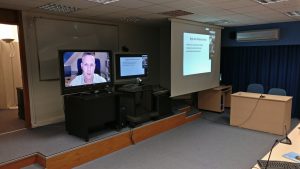On 4 April 2018, the Center for Foreign Policy and Peace Research hosted the third session of the Third E-Workshop “Defense Industries in the 21st Century: A Comparative Analysis”. In this session, we had two presentations. Doctoral Student Conway Waddington, University of Johannesburg and Senior Correspondent at African Defence Review, presented the paper entitled: The Nigerian Defense Sector: ‘’Tied to International Procurement and Driven by Numerous Threats’’. Çağlar Kurç, Post Doctoral Fellow at the Center For Foreign Policy and Peace Research, University of Bilkent, presented the paper entitled, Azerbaijan Defense Industry: ‘’A Mean for a Foreign Policy Goal’’.
Abstracts:
The Nigerian Defense Sector: ‘’Tied to International Procurement and Driven by Numerous Threats’’
The paper explores the Nigerian defence sector’s reliance on international imports and provides an outline of factors that drive, and limit procurement. The procurement of aircraft for ISR and CAS will be explored, as an illustrative example of the broader dynamics of the Nigerian defence sector. Nigerian air capabilities are limited but are noteworthy in terms of recent efforts to expand close air support by both fixed-wing and rotorcraft, as well as a rapidly growing pool of ISR platforms. Chinese UAVs also grant Nigeria a rare, regionally speaking, remote strike capability, which will also be discussed. This paper also seeks to outline efforts by the Nigerian defence sector to rehabilitate and expand indigenous production capabilities, particularly in terms of maritime platforms, but also in terms of land-based weapons and materiel.
Azerbaijan Defense Industry: ‘’A Mean for a Foreign Policy Goal’’
This paper argues that Azerbaijan aims to bring Armenia to the negotiation table by exhausting through “war of attrition” and forcing it to divert scarce resources to arms buildup. To this end, defense industrialization is geared towards both maintaining the military capabilities and providing weapon systems that could create a tactical advantage to Azerbaijan National Army at the Line of Contact, such as producing anti-materiel rifles, UAVs and LMAMs. From the perspective of this limited goal, the dependency on Russia does not necessarily hinder Azerbaijan’s foreign policy goal and its limited but dangerous use of force. Second, Ilham Aliyev uses the symbolic power of defense industrialization, especially in domestic politics, through the discourse of constructing powerful military and regaining the lost territory. In so doing, nationalistic feelings will become a supporting pillar for the regime. In the end, Azerbaijan does not seek self-sufficiency in arms production to break the influence of Russia but rather uses the defense industrialization to serve as a mean for reaching the foreign policy goal and shoring up domestic support for the regime.



